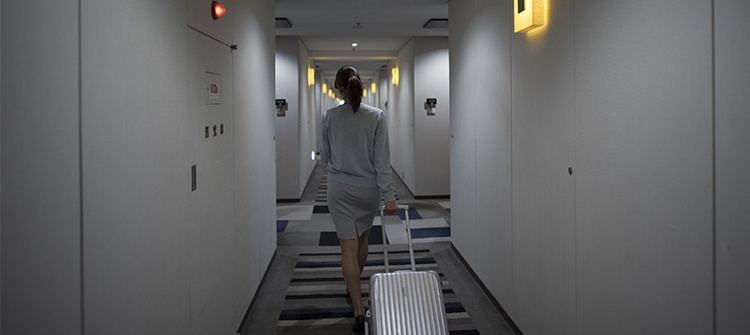How Technology Transforms the Role of Corporate Travel Managers
Posted by Mike Atherton on 20 October, 2017

Back in 2014, a report by the Global Business Travel Association (GBTA) Foundation, sponsored by Sabre Travel Network, predicted that technology would transform the role of corporate travel managers by 2019. Now that we have reached the halfway mark of that prediction, how far along the road are travel managers and how can technology help their role evolve?
The role of the corporate travel manager in 2017 is more demanding than ever before. Along with primary duties of delivering value to your organisation and being responsible for the travel budget; you're expected to be a shrewd negotiator, be tech and data savvy, set travel policies, manage travel policy compliance, and keep your corporate travellers safe.
With the workload and varied responsibilities of several jobs combined, it’s not surprising that the biggest travel management challenge is one of time.
According to the GBTA’s 2014 study, Travel Manager 2020: Foundational Shifts in the Role of the Travel Manager, 86% of travel managers surveyed felt that the next 3-5 years would see a shift towards a more strategic role, aided by new technologies. However, what’s emerged from research since then is evidence of a reality gap.
Day-to-day tasks, such as managing vendor relationships and enforcing policy compliance, still tend to dominate travel management, with little time left for strategic thinking. Indeed, a 2015 whitepaper from Sabre Travel Network revealed that while respondents were conscious of strategy’s importance, they expected to be managing roughly the same distribution of responsibility in 3-5 years’ time.
So, how can you free up the time needed to delve into more strategic matters? The answer may well come from technology already at your disposal.
How Can Technology Help?
Data
Data is of immense value to corporate travel managers. Without accurate, reliable and timely data about how travel programmes are performing, you are always going to struggle with C-suite and procurement buy-in or strategy development.
The problem isn’t a lack of data; on the contrary, most travel managers are swimming in data. It's accessing the right data that is the issue. By which is meant: the data senior executives want or need to justify procurement decisions and the data you need to inform your own choices.
Travel management software is beginning to answer this need. The inbuilt reporting and analytics present in some apps can help you identify and quantify the data you need. This can help save time and, more importantly, give you access to the data that demonstrates the value your programme brings to the company (data which will also form the basis of any strategy).
Duty of Care
Making sure staff are safe is one of the key tenets of successful travel management, but it can be time-consuming. Obviously,
Increasingly, travel management software providers are including GPS tracking of staff as a feature of their risk management offering, keeping you informed as to where the employees under your charge are at all times.
Some take this one step further and provide an identification and alert system for affected travellers in the event of an emergency. The benefits of this are twofold: not only do you benefit from enhanced responsiveness to emergency situations, but you also save time that would have previously been spent tracking and checking in with staff.
In addition, the use of electronic personalised risk briefings for staff has become more widespread in recent years, giving travellers themselves a more proactive role in their own safety. You can now plan itineraries with up-to-the-minute risk information, before delivering them to staff electronically. This may not sound like much, but consider that it ends the need for lengthy face-to-face briefings, and it becomes apparent this relatively small change could create considerable time savings for travel managers.
Compliance
Creating and enforcing travel policies is one of a travel manager's key areas of responsibility. After all, travel policies hold importance for several key business goals, including
The downside to this is that you spend a substantial chunk of your time communicating, educating and reminding, plus reporting and escalating noncompliance with travel policies. It's all time that could be better used to more strategic ends.
Most staff non-compliance tends to be down to ignorance rather than anything else. So, one way around the problem is to ensure staff always have access to a copy of the policy. This is exactly what some travel management apps now do, by giving travellers in-app access to a copy of the travel policy wherever they are.
It’s a simple idea, but one that could make a real difference to compliance with travel policy and the time spent educating non-compliant staff.
Alongside this, as mobile travel evolves into mobile travel booking, it's of increasing importance to work with a TMC or technology partner that can ensure your travellers are served with in-policy content first, preventing a potential "policy free for all".
Optimising Document Delivery
One final suggestion for the optimisation of travel managers' time is automation of the document delivery process.
Modern document delivery products send travel itineraries straight to an employee’s email inbox as a single, consolidated package. This cuts the time involved in providing multiple travel documents for staff and removes the need for travel briefings and physical document collection.
Decoupling the fulfilment of travel products from the user experience can help you drive efficiency and consistency across your organisation, especially when more than one TMC is used across different regions. This way, should you change TMC the organisation change is minimised.
Again, it’s hardly the most complex idea, but one that can save crucial minutes over the course of a working day or week.
The suggestions put forward are by no means exhaustive. Other technologies such as
For the meantime, the changes most likely to help corporate travel managers reach their goal are simple ones involving process and efficiency. The equation is a simple: if you can reduce the time spent carrying out basic tasks you should, in turn, have more time for strategic thinking.
To find out more about how travel management technology can revolutionise your role, book a consultation to speak to one of our experts.
Take a look at our free ebook on the future of business travel and find out what leading industry experts have to say.


